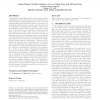Free Online Productivity Tools
i2Speak
i2Symbol
i2OCR
iTex2Img
iWeb2Print
iWeb2Shot
i2Type
iPdf2Split
iPdf2Merge
i2Bopomofo
i2Arabic
i2Style
i2Image
i2PDF
iLatex2Rtf
Sci2ools
ICS
2011
Tsinghua U.
2011
Tsinghua U.
High performance linpack benchmark: a fault tolerant implementation without checkpointing
The probability that a failure will occur before the end of the computation increases as the number of processors used in a high performance computing application increases. For long running applications using a large number of processors, it is essential that fault tolerance be used to prevent a total loss of all finished computations after a failure. While checkpointing has been very useful to tolerate failures for a long time, it often introduces a considerable overhead especially when applications modify a large amount of memory between checkpoints and the number of processors is large. In this paper, we propose an algorithm-based recovery scheme for the High Performance Linpack benchmark (which modifies a large amount of memory in each iteration) to tolerate fail-stop failures without checkpointing. It was proved by Huang and Abraham that a checksum added to a matrix will be maintained after the matrix is factored. We demonstrate that, for the right-looking LU factorization alg...
Distributed And Parallel Computing | Fault Tolerance | ICS 2011 | Recovery Scheme | Supercomputer Jaguar |
Related Content
| Added | 29 Aug 2011 |
| Updated | 29 Aug 2011 |
| Type | Journal |
| Year | 2011 |
| Where | ICS |
| Authors | Teresa Davies, Christer Karlsson, Hui Liu, Chong Ding, Zizhong Chen |
Comments (0)

